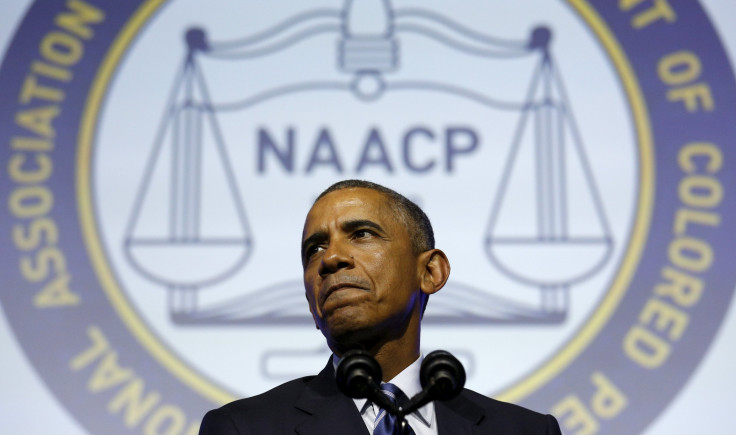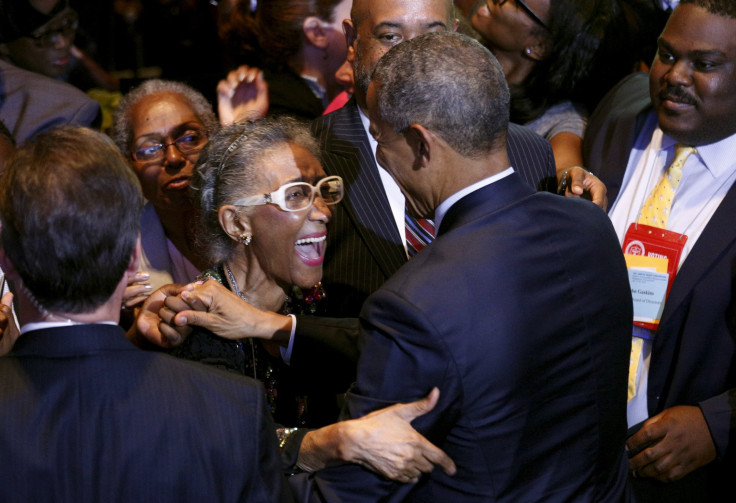Obama NAACP Speech: Criminal Justice Reform Is Next On Agenda To Help Communities Of Color, President Says

PHILADELPHIA -- Cedric Granberry was upset when President Barack Obama sent the vice president to address the National Association for the Advancement of Colored People’s convention a few years ago, during the 2012 presidential campaign. So on Tuesday, when Obama had a chance to make it up to the organization, Granberry was excited to know that the president would be there and that he would emphasize a need for criminal justice reform in the U.S.
“It’s what impacts our community the most,” said Granberry, a 39-year-old African-American president of the Tyler, Texas, branch of the NAACP, located about 100 miles east of Dallas. “He has paid attention to the fact that there is a problem – the acknowledgement from a sitting president is worth its weight in gold,” he said.
Obama’s address, delivered to approximately 4,000 people packed into a cavernous hall in the Philadelphia Convention Center, came as he was trying to solidify his legacy as both the first black U.S. president and a Democratic leader carrying the hopes of liberals and progressives for social change. While the president has not found allies in Washington’s Republican establishment on gun control, immigration reform and taxing the rich to bring middle-class relief, his message here was clear: Criminal justice reforms that would help to reverse the impact of a decades-long war on drugs was crucial for the country’s communities of color.
The uneven treatment of black and Latino men by the criminal justice system “did not happen by accident,” Obama said in his remarks Tuesday. “We can’t be satisfied and are not satisfied until the opportunity gap is closed for everybody in America.”
With the nation spending $80 billion annually to keep people imprisoned – enough to eliminate tuition at public colleges or double the salaries of public school teachers – investing in early childhood education, changing the way offenders are sentenced and increasing rehabilitative programs in prison are a multipronged way of lessening the societal toll of incarceration, Obama said.
“We’ve locked up nonviolent drug offenders more than ever before, for longer than ever before,” the president said. “Our criminal justice system isn’t as smart, isn’t as safe, and isn’t as fair as it should be. We need to do something about it.”
Strong criminal justice policy speech by the @POTUS happening now at @NAACP convention. #FREEAMERICA
— John Legend (@johnlegend) July 14, 2015Criminal justice reform is an issue that Philadelphia native Jamira Burley has come to know intimately. Both of her parents and 11 of 13 of her brothers have been jailed or imprisoned. One of her brothers was killed by gun violence when she was just 15 years old.
“There is a systemic trauma and generational trauma [to incarceration] that hasn’t fully been addressed,” said Burley, 26, a campaigner for the human rights organization Amnesty International, who is doubtful that the president could shepherd the needed reforms in the remaining days of his presidency. “He has done the best he could. But he may lay the foundation for how [criminal justice reform] becomes an issue in the 2016 election.”
Tuesday was the first time that the president had a chance to address a largely black audience since late last month when he delivered the eulogy at state Sen. Clementa Pinckney’s funeral. A 21-year-old white man who told authorities he targeted a historically black church to start a race war killed Pinckney, the pastor of Mother Emanuel African Methodist Episcopal Church in Charleston, South Carolina, along with eight members of his congregation.
Obama has delivered several well-received speeches on civil rights and race relations since catapulting to national prominence as a state senator from Illinois more than a decade ago. Recently, it was Obama’s seemingly impromptu rendition of “Amazing Grace,” the standard Christian hymn for tragic occasions, following the aforementioned rousing eulogy delivered to AME church leaders and hundreds of Pinckney mourners, which drew headlines.

That hymn would have played well with the convention crowd at the NAACP, an organization whose 106-year history is rooted in the traditions of the black church. An organist and pianist played reverent overtures, as speakers roused the crowd with messages of self-empowerment before the president’s remarks. But before he began speaking, Obama let attendees down easy. “I am not singing today,” he said to laughs.
Melvin Blackwell, however, said he didn’t come to hear the president’s singing voice. The Fort Washington, Maryland resident, who is black and aspires to a career in informational technology, said he wanted an end to overzealous policing that put some many young men like him in jail.
“It would change a lot for our community if you didn’t get a record just for having a dime bag of weed,” Blackwell, 18, said. Moreover, he wanted Obama to “make people see us as equals. Like we’re not something different.”
On Monday, Obama signed an order that would free or reduce the sentences of 46 federal prisoners convicted of nonviolent drug offenses, a prelude of sorts for his scheduled visit later this week to a federal prison that would make him the first sitting president to do so. The clemency was part of a broader reform agenda that has been in the works for years and aims to reduce oversentencing for nonviolent offenses in the U.S. It came as Democratic and Republican leaders in Washington were backing away from tough-on-crime policies that led to mass incarceration and disproportionately affected young black and Latino men.
Civil rights leaders said the commutations of those prison sentences were a step in the right direction. However, that step was minuscule compared to the toll of a 45-year war on drugs that has cost $1 trillion and left 65 million people with criminal records, said Glenn Martin, president and founder of JustLeadershipUSA, an organization seeking an end to mass incarceration policies.
Obama said signs that bipartisan members of Congress may take up criminal justice reform this year were encouraging him. “What has changed in recent years is the eyes of more Americans have been opened to this truth -- partly because of cameras, partly because of tragedy, and partly because the statistics cannot be ignored,” he said in reference to deaths of black men at the hands of police officers that have sparked nationwide protests in the last year.
“Justice is not to the absence of oppression, it’s the presence of opportunity,” Obama added. “Justice is young people know their lives matter, not because they read it in a hashtag.”
Burma Shipman, a 63-year-old secretary of the Greensboro, North Carolina, branch of the NAACP, said Obama’s criminal justice focus was in line with an equality agenda that she’d like to see continue in the remaining days of his presidency. More than ever, she said, minorities deserve the second chances in life that are given to nonminorities.
“Making one bad decision shouldn’t determine the rest of your life,” Shipman said. “We all come up short somewhere or another. Obama standing up for young black men is what civil rights is all about.”
© Copyright IBTimes 2024. All rights reserved.





















